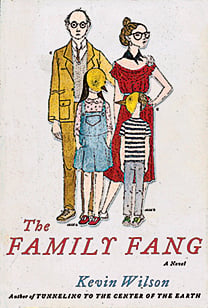 “It’s a sad world. It’s unforgiving,” sing Child A, age eight, and Child B, age six. “Kill all parents, so you can keep living.” The children are busking, A on guitar and B on the drums. The crowd cringes politely until a man yells: “You’re terrible!” and suddenly mayhem breaks out, half the onlookers defending the kids and half attacking them. A and B finish their set, and flee the fracas. Later, at a pre-arranged pickup location, their father—composer of Kill All Parents and instigator of said fracas—tousles their hair. “You really were terrible,” he tells them tenderly.
“It’s a sad world. It’s unforgiving,” sing Child A, age eight, and Child B, age six. “Kill all parents, so you can keep living.” The children are busking, A on guitar and B on the drums. The crowd cringes politely until a man yells: “You’re terrible!” and suddenly mayhem breaks out, half the onlookers defending the kids and half attacking them. A and B finish their set, and flee the fracas. Later, at a pre-arranged pickup location, their father—composer of Kill All Parents and instigator of said fracas—tousles their hair. “You really were terrible,” he tells them tenderly.
Welcome to the childhoods of Annie (A) and Buster (B) Fang. Their parents, Caleb and Camille, are artists who work with a unique medium: human vulnerability. Their “pieces” include plunging a planeload of passengers into agonizing awkwardness by staging a marriage-proposal rejection over the flight intercom. They have also dabbled in gunplay and self-immolation, and even flirted with incest. And, despite being advised by Caleb’s mentor that “kids kill art,” the Fangs have built their award-winning career on the (often involuntary) participation of Child A and B in each of their “strange and beautiful” creations.
Kevin Wilson recently had the illustrations of Annie and Buster that appear on the cover of his second novel tattooed on his left arm. It’s easy to see why he would want to keep such spirited and fallible characters close. As young adults, the siblings enjoy success in their own creative pursuits, then falter quite dazzlingly when each unwittingly pulls a Fang—Annie by one-upping a last-minute stage direction to bare her breasts, Buster by abandoning all journalistic integrity (and common sense) while reporting on war vets and “spud guns.” They wind up back at home, the last place either ever expected to go willingly. This allows the Fangs one final performance, through which Wilson cunningly blows up an essential truth about families—for all your efforts to escape from your parents, you spend most of your life trying to catch up with them.